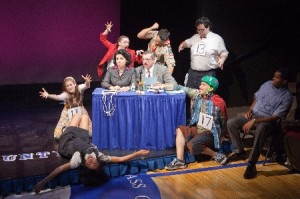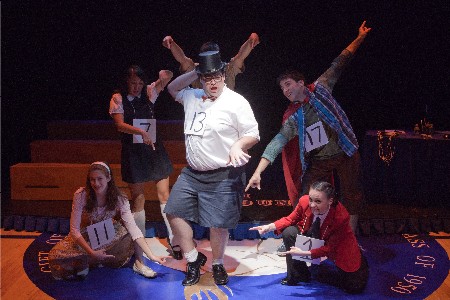Theater Review: Spelling Bee Wild
This musical may have a small focus and a smaller message than William Finn’s other shows, but the highly likable characters produce big laughs and plenty of empathy.

The cast of the Lyric Stage company production of The 25th Annual Putnam County Spelling Bee discovers life is pandemonium. Photo: Mark S. Howard
The 25th Annual Putnam County Spelling Bee. Music and Lyrics by William Finn. Book by Rachel Sheinkin. Conceived by Rebecca Feldman. Additional Material by Jan Reiss. Directed and Choreographed by Stephen Terrell. Musical Direction by Jonathan Goldberg. Staged by The Lyric Stage Company of Boston at The Lyric Stage, 140 Clarendon Street, Boston, MA, 02116, through October 2.
Reviewed by Alyssa Machado
Courtesy of the Lyric Stage Company, The 25th Annual Putnam County Spelling Bee returns to Massachusetts, where it originated in a workshop at the Barrington Stage Company in Sheffield, MA in 2004 before moving to Off-Broadway and Broadway. This quirky musical about a group of misfit middle-schoolers competing to go to the National Spelling Bee departs from composer and lyricist William Finn’s usual challenging musical theater fare in favor of something cuter and more simplistic.
In Finn’s best-known musicals, Falsettos (1992) and A New Brain (1998), the sympathetic characters anchor the audience in a deep, vast, and often dark ocean of the greater human condition. Below the immediate, often funny, actions lie large-scale and frightening challenges such as facing mortality in the form of AIDs and brain tumors or figuring out gay relationships in the 80s.
Compared to those shows, Spelling Bee is a human-condition kiddie pool: fun, but shallow and contained. The action stays in the Gymnatorium on one afternoon, and the characters’ issues are, appropriately, the typical grade-school kind: absentee or pushy parents, unfortunate erections, and crushes. While the music is pleasant enough, none of the songs reach the heartbreaking poignancy of “What More Can I Say” from Falsettos or the catchy, stick-in-your-head quality of “Heart and Music” from A New Brain.
The funniest lines emerge from the Tony-Award-winning book by Rachel Sheinkin. The creative “please use the word in sentence” examples, brilliantly delivered by a disinterested, wry Will McGarrahan (Douglas Panch, the Assistant Principal), consistently hit their mark. (“Guacamole: the Mexican pudding.”)

William Barfee (played by Daniel Vito Siefring) entreats his Magic Foot for spelling help. Photo: Mark S. Howard
The other eight equally talented Lyric Stage cast members keep the ensemble action moving smoothly, generating plenty of laughs in the process. Although many of the actors playing the spellers looked too old to play middle-schoolers, their open and earnest portrayals made it easy to accept them as kids for a short time.
Daniel Vito Siefring and Krista Buccellato stand out amid the rest of the strong group. Siefring manages to make smug, mucus-laden, nerd/bully William Barfee instantly recognizable and distasteful while retaining enough bits of vulnerability to avoid the fate of a stereotype. Krista Buccellato’s strong and pure voice and shy determination made Olive, the quiet bee underdog, instantly endearing.
Embracing the show’s improv roots, members of the cast address the audience as attendees of the bee, creating unique jokes about the audience spellers recruited to be on stage, and interacting with viewers in character prior to the performance. Spelling Bee fit perfectly into the smaller venue of the Lyric Stage, where everyone is as up close and personal as they would be at their local bee. To its credit, the show is refreshingly free of the expensive spectacle that is considered essential in most hit musicals: the intimacy and opportunity to focus on the characters is a key part of the show’s charm.
Director and Choreographer Stephen Terrell keeps the show lively by ensuring that the actors face all sides of the audience without remaining anywhere too long. Terrell even includes the audience spellers on the stage in the group choreography with some easy hand motions and on-the-fly direction from the cast. The decision not to amplify the singers adds to the intimacy, and, for the most part, the actors voices carry easily with no electronic assistance.
Without an intermission, the hour-and-45-minute show drags a bit toward the end mostly due to the repetitive nature of spelling bees and the lack of high stakes. Real life National Spelling Bee participants seem to quiver on the brink of shattering or elevating their lives as they spell. The Putnam County spellers use spelling mainly as therapy, a means to explore the troubles in their lives: the parental discord between Logainne’s dads, the absenteeism of Olive’s parents, Marcy’s drive to be a perfect overachiever, or Leaf’s supposed lack of intelligence. A winner is eventually crowned, but the show, in a cheerful epilogue, assures everyone that the losers live mostly happy lives anyway. This resolution may be inspiring for the characters, but it leaves the audience with little to consider beyond “life is random and unfair, life is pandemonium.”
The 25th Annual Putnam County Spelling Bee may have a small focus and a smaller message than Finn’s other shows, but the highly likable characters produce big laughs and plenty of empathy. The solid Lyric Stage Company production proves that with an agile cast and an earnest, apt production, spelling beats spectacle every time.
Tagged:
